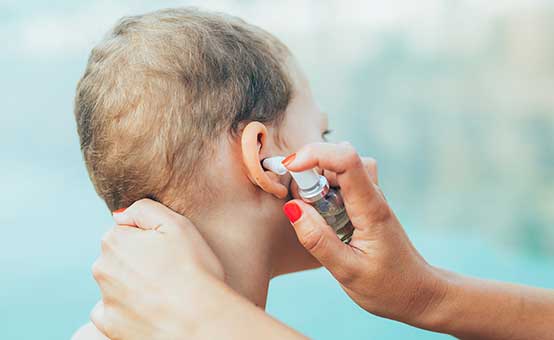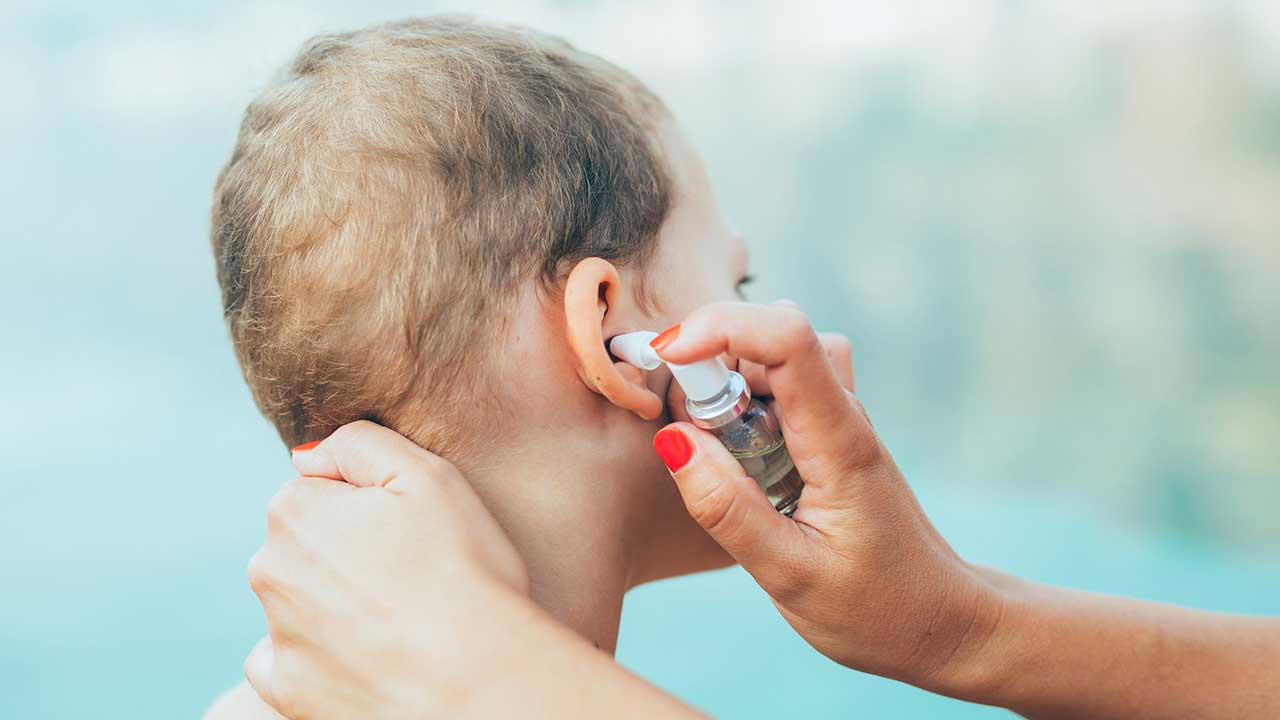

Below you'll find answers to the questions we get asked the most about swimmer's ear.
Swimmer’s ear affects one in 200 Americans every year and is present in chronic form in 3-5 percent of the population. Swimmers, surfers and other individuals who are exposed to wet and warm conditions are at an increased risk.
Otitis externa, commonly referred to as swimmer's ear, is the acute inflammation or infection of the external auditory canal, resulting in ear pain and pus discharge.
The external auditory canal is the tubular opening between the outside environment and the eardrum (tympanic membrane). It is covered by skin and secretes earwax (cerumen), which helps protect against infection.
Breakdown of the external ear canal's protective barrier leads to infection. Excessive moisture, mechanical trauma or underlying skin conditions are contributing factors. The bacteria normally found in the external ear canal often trigger the infection. With frequent immersion, water swells the cells lining the ear canal. Eventually, these cells separate far enough for the bacteria that are normally found on the surface of the ear canal to penetrate the skin, where they find a warm environment and start to multiply. Otitis externa is more likely to develop if the skin in the ear canal is already chafed and cracked by excessive moisture from showering or scratching. Fungus or bacteria from the water can easily invade damaged skin.
Seborrheic dermatitis, psoriasis and excessive cleaning of wax from the ears that injures the skin lining of the external ear canal may increase susceptibility of the ear canal to infection. Excessive debris or cerumen may trap water in the canal.
The chief complaint is generally itching often accompanied by pain, tenderness and swelling of the ear canal. If left untreated, the swelling can increase to include nearby lymph nodes and produce enough pain that moving the jaw becomes uncomfortable.
Stop swimming and diving; schedule an appointment with your physician. Do not put anything in your ear unless instructed to do so. If you have diabetes or take medicine that suppresses your immune system, swimmer's ear can cause severe problems that require immediate medical attention. It is important for your physician to rule out external ear squeeze, otitis media and mastoiditis (infection of the bone just behind the ear).
What about my fitness to dive?
Return to diving is possible once your physician determines that the infection has resolved.
Keep your ears clean and dry.
If you know you don't have a punctured eardrum, you can use over-the-counter eardrops or homemade preventive eardrops before and after swimming. This mixture of one part white vinegar to one part rubbing alcohol may help promote drying and prevent the growth of bacteria and fungi that can cause swimmer's ear. At the end of each day of activity in the water, put five drops of the solution into each ear. Let it stay for five minutes before draining back out.
Eardrops are formulated to help dry the ear after exposure and lower the acidity (pH), making the external ear canal an unfriendly environment for bacterial or fungal colonization and infection. Common ingredients include acetic acid (the active ingredient in vinegar), boric acid, aluminum acetate, sodium acetate, isopropyl alcohol and glycerin. The acids alter pH, which retards bacterial growth; aluminum acetate and sodium acetate are astringents, which shrink tissues. Isopropyl alcohol helps dry the tissues, and glycerin may help lubricate the skin to prevent excessive drying.
Swimmer's Ear - Mayo Clinic
Swimmer's Ear: 10 Things You Need to Know - Penn Medicine
External Otitis - Merck Manual Professional Version
MORE FROM
SAFE PASSAGE

BOATING SAFETY | Aug 2, 2019
Boating with Kids: How to Keep Them Safe (and Happy!)

TRAVEL HEALTH | AUG 2, 2019
First Aid for Portuguese Man-of-War Stings
THIS WEBSITE DOES NOT PROVIDE MEDICAL OR DENTAL ADVICE.
It is intended for general informational purposes only and does not address individual circumstances. It is not a substitute for professional medical or dental advice, diagnosis or treatment and should not be relied on to make decisions about your health. Never ignore professional medical or dental advice in seeking treatment because of something you have read on the DAN Boater website. If you think you may have a medical emergency, immediately call your doctor, dial 911, or contact emergency services nearest you.